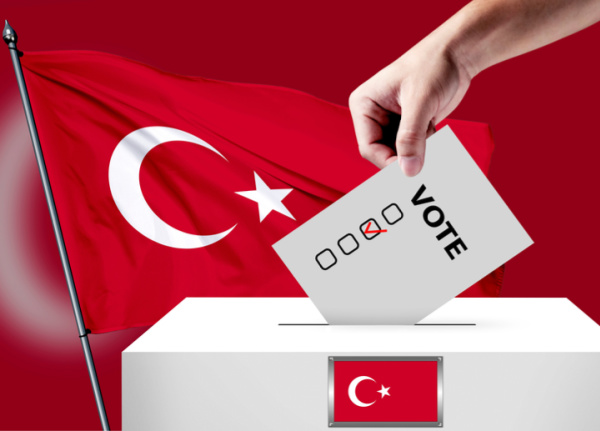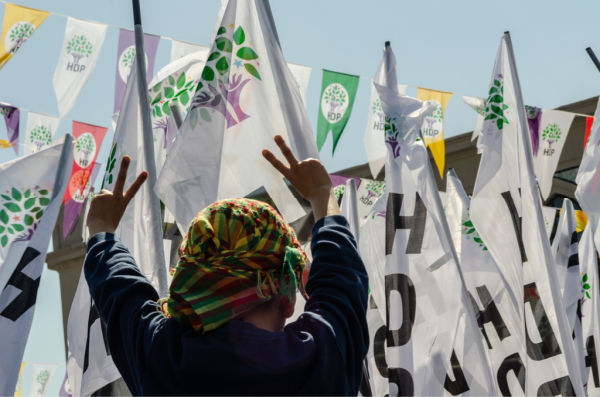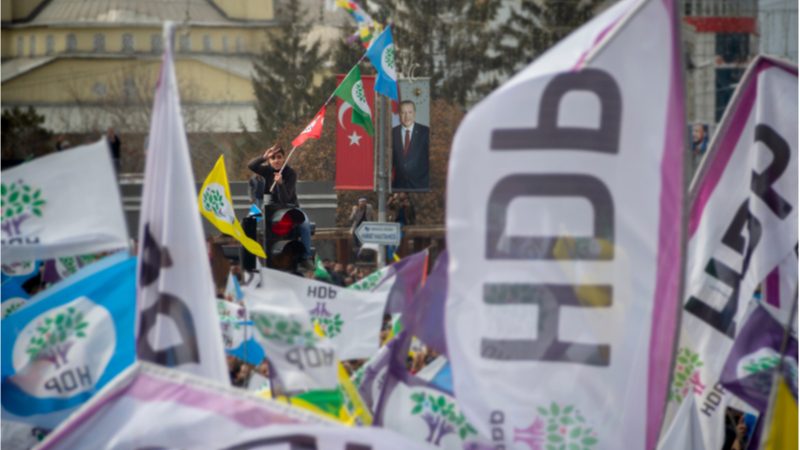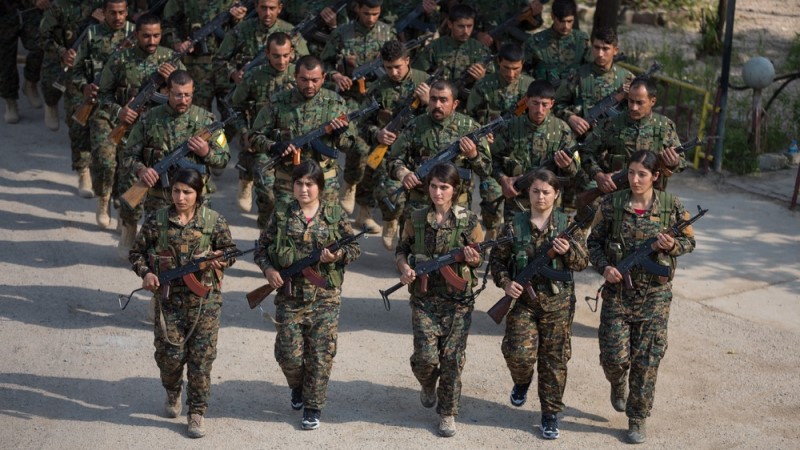The CHP and the Kurds: The Impasse of Progressive Politics in Turkey
By Halil Karaveli
The reconciliation with the PKK has effectively laid the ground for a de facto alliance between the right-wing AKP-MHP bloc and the ostensibly left-wing Kurdish movement. The main opposition CHP faces a difficult task. It suffers under the crackdown of the regime, is increasingly isolated and is stigmatized as the purported enemy of the Kurds by its erstwhile, “progressive” allies.

Credit: PICRYL
BACKGROUND: The Republican People’s Party (CHP) has enjoyed a lead in the polls since it dethroned the ruling Justice and Development Party (AKP) as Turkey’s leading party in the local elections in 2024. Since the election of Özgür Özel as party leader in 2023, the CHP combines an unprejudiced, inclusive stance towards conservatives with an attempt to chart a social democratic course. Just as crucially, the CHP has succeeded in appealing to Kurdish voters, notably in Istanbul, which is home to the largest concentrated Kurdish population in Turkey.
In a conversation with the Turkey Analyst in Istanbul on November 5, CHP leader Özel explained that the party’s strategy is to sway conservative voters with leftist policies that address poverty and inequality, but to do so without brandishing a leftist banner that would put off conservatives and “workers that are right-wing.”
That’s obviously a sensible strategy in a country where inequalities in wealth and income have increased dramatically during the AKP’s more than two decades in power, but where nonetheless only a minority of the population identifies as leftist. Özel recognizes that the CHP has become a pole of attraction by default as societal discontent “seeks an address.” In other countries, he noted, discontent and anger have found an address in right-wing populism and extremism. Policies must necessarily be framed in a language that speaks to all citizens. “In the fight against fascism, we need to maintain as broad an alliance as possible,” Özel stressed. Yet the prospects of maintaining -- or rather building -- such a broad democratic alliance looks increasingly unpromising in the wake of the reconciliation between the Turkish state and the Kurdish political movement.
The pro-Kurdish Peoples’ Equality and Democracy (DEM) Party and the Kurdistan Workers’ Party (PKK) -- that represent the civilian and armed wings respectively of the Kurdish movement -- are ostensibly left-wing. Selahattin Demirtaş, the former co-chair of the previous iteration of the pro-Kurdish party, known as the HDP, who has been imprisoned since 2016, in 2021 called on Turkey’s left-wing forces to form a “strong left bloc” to build democracy after the rule of the AKP. Demirtaş argued that democracy was going to elude Turkey in the absence of the left and “the voice of the labor.” Indeed, CHP leader Özel recognizes that the weakness of organized labor is a handicap. The last time the CHP was the leading party of Turkey, in the 1970s, it drew strength from a labor movement that organized 90 percent of the workforce. When Recep Tayyip Erdoğan came to power in 2003, 58 percent of the workforce was unionized; today less than 15 percent is. Removing the obstacles to unionization is going to be crucial for the future prospects of social democracy in Turkey. But more immediately, the CHP needs to retain the support of the Kurds.
Özel says that a progressive alliance – that would bring Turkish social democrats and Kurdish leftists together -- is “fine,” but that it nonetheless imports not to lose others – presumably conservatives and Turkish nationalists – “who are also oppressed.” But in any case, the Kurdish movement itself is today displaying little interest in embarking on the path that Demirtaş earlier advocated for. Demirtaş has himself since shifted course and more recently recommended that the DEM Party position itself as a third force, equidistant to the AKP and the CHP.
Meanwhile, the reconciliation with the PKK that began a year ago, when Devlet Bahçeli, the leader of the far right Nationalist Movement Party (MHP), called on the PKK’s imprisoned leader Abdullah Öcalan to dissolve the militant group and in return sensationally held out the prospect of his release, has effectively laid the ground for a de facto alliance between the right-wing AKP-MHP bloc and the Kurdish movement.
In February 2025, Öcalan called on the PKK to dissolve, a call that the organization heeded in May. However, the Turkish state has so far not responded by releasing any imprisoned Kurdish politicians; on the contrary, it has ignored the recent ruling of the European Court Human Rights to release Demirtaş. Nor has the Kurdish mayors who have been removed from their posts been reinstated. CHP leader Özel points out that Erdoğan’s “potential to deceive” is significant. Özel expressed the belief that the Kurds will ultimately “not forget what they have suffered at Erdoğan’s hands” and rally to him. Indeed, according to surveys, a vast majority of the DEM Party voters would not vote to reelect Erdoğan. Yet the calculations and motives of the Kurdish leadership are an entirely different matter.
IMPLICATIONS: The priority for the Kurdish leadership – of the DEM Party and of the PKK – is the release of Öcalan, the pardon and release of all other PKK militants in Turkish prisons and the return of the PKK leadership to Turkey where they would engage in “democratic politics.” The contours of the deal between the Turkish state and the PKK are not difficult to discern: in return for Öcalan’s freedom, the Kurdish leadership will cease to be part of the opposition – which it effectively already has -- and enable the reelection of Erdoğan. Meanwhile, the co-optation of the PKK would ensure Turkish influence in northern Syria which is controlled by the PKK’s affiliates YPG/PYD.
As the crackdown on the CHP has demonstrated – 17 CHP mayors, including the party’s presidential candidate Ekrem İmamoğlu, have been incarcerated this year – Erdoğan is intent on establishing a full-blown autocracy. Democrats in Turkey have long held that the solution of the Kurdish problem would usher in full democratization. Yet it is now clear that the Kurdish leadership is pinning its hopes on a revival of some version of the old feudal deal between the Turkish state and Kurdish tribal leaders. Under it, from the 1950s to the late 1970s, Kurdish tribal leaders were by and large left socially and economically in control of the country’s Kurdish region in return for delivering the votes of their tribes to the ruling conservative parties, the AKP’s predecessors. That was the reason the PKK began as a Marxist revolutionary movement in opposition both to Kurdish feudalism and the Turkish state. Today, ironically, Öcalan seeks to re-enact the erstwhile feudal power-sharing arrangement with the state. He has a partner in the nationalist leader Bahçeli, who Öcalan recognizes as “the voice of the state.”
In 2000 it took much persuasion by the democratic leftist Prime Minister Bülent Ecevit before Bahçeli, who then served as deputy prime minister, accepted a moratorium on the execution of Öcalan, who had been sentenced to death after he was captured in Nairobi, Kenya in February 1999 and extradited to Turkey. Today, Bahçeli goes out of his way to endow Öcalan with legitimacy. Bahçeli reverentially refers to Öcalan as the “founding leader,” in lieu of “baby slayer,” as he had until recently been called in Turkish public discourse. Bahçeli has also insisted that members of the parliamentary commission that has been set up to promote the reconciliation process visit Öcalan on his prison island İmralı. Bahçeli claimed that “visiting İmralı is not different than visiting Silivri,” the location of the prison where among others Istanbul’s mayor İmamoğlu is incarcerated, astoundingly equating the innocent political prisoners of the AKP-MHP regime with the convicted leader of a terrorist organization.
The visit to Öcalan finally took place on November 24, with parliamentarians from AKP, MHP and DEM Party, but not CHP, participating. The decision of the CHP not to participate in what amounted to an endeavor to bestow legitimacy on Öcalan, who is widely detested in Turkish society, drew the ire of the DEM Party and the PKK. The CHP argues that the elevation of Öcalan to the official representative of the Kurds jeopardizes the reconciliation process, rendering it difficult to secure public consent for steps that promote Turkish-Kurdish equality. Public support for the process has fallen from 80 percent in September to under 60 percent. DEM Party representatives have put the blame on Turkish nationalist media outlets. Pervin Buldan, a leading spokesperson of the party, reported that “Öcalan is unhappy with the media,” and called on the AKP government to take action against critics in the media, pointing out that the government enjoys discretionary power, as it controls the judiciary.
CONCLUSIONS: In a new party program, the CHP promises to promulgate the right to education in the mother tongue and to apply the European charter of local self-government. Both promises meet the demands of the Kurdish political movement. Yet Kurdish representatives slammed the CHP as the enemy of the Kurds. Tülay Hatimoğulları, co-chair of the DEM Party, accused the CHP of “reviving the codes of a century of denial and annihilation.” Murat Karayılan, a leading PKK representative, “warned” the CHP that “it will pay a price for its mistake.” Mustafa Karasu, another PKK representative, claimed that CHP has now showed that its earlier attempts to prove that the party is “the friend of the Kurds” were “insincere.”
CHP representatives recognize that their refusal to contribute to the elevation of Öcalan is bound to cost them crucial support among Kurdish voters and that the party needs to make a sustained effort to convince the Kurds of its sincerity. Yet the CHP faces a difficult task. It suffers under the crackdown of Erdoğan, is increasingly isolated and is stigmatized as the purported enemy of the Kurds by its erstwhile, “progressive” allies.
“Why should it be impossible for those who call for equality and fraternity to win a majority? Why can’t we come together and form a democratic bloc? Are we condemned to a fascist bloc?” the Kurdish leader Selahattin Demirtaş asked in November 2016, days before he was arrested. It’s the self-professed Kurdish democrats who owe the answer to those questions today.
AUTHOR'S BIO: Halil Karaveli is a Senior Fellow with the Central Asia-Caucasus Institute & Silk Road Studies Program Joint Center and the Editor of the Turkey Analyst. He is the author of Why Turkey is Authoritarian: From Atatürk to Erdogan (Pluto Press)
The İmamoğlu sentence: Will Istanbul Share the Fate of Diyarbakır?
By Halil Karaveli
January 12, 2022
The political destruction of Istanbul mayor Ekrem İmamoğlu is ultimately meant to demonstrate that the alliance, supported by the Kurdish political movement, which carried him to victory in 2019, is not going to be allowed to repeat its success at the national level. In theory, the removal of İmamoğlu from office will enable the mainstream opposition to turn the presidential election into a referendum about popular sovereignty. However, to succeed it would have to convince voters in Diyarbakır, Mardin and Van that it is as sensitive about their sovereignty as it is about that of the electorate in Istanbul. This is unlikely as the right-wing nationalist Good party of the main opposition alliance resists democratic openings to the Kurds. The division between rigid statist-nationalism and popular democracy runs through the ruling alliance of the AKP and the MHP as well. To tip the balance in favor of popular democracy, Turkey needs a rearrangement of political alliances.

Demirtaş, the HDP and the Kurdish political movement’s struggle for relevance
By Gareth Jenkins
October 27, 2022
Turkey’s Kurds have the potential to play a key role in Turkey’s forthcoming presidential and parliamentary elections, which are due to be held in June 2023 at the latest. Their votes could be critical to Recep Tayyip Erdoğan’s hopes of securing a third term as president and are likely to determine whether the alliance between his Justice and Development Party (AKP) and the Nationalist Action Party (MHP) retains its parliamentary majority. But, with most of its leaders in prison or facing prosecution, its members expelled from virtually all of the local authorities they won in the last local elections and its main political party, the Peoples’ Democratic Party (HDP), facing closure by the Constitutional Court, the Kurdish political movement faces a major challenge in persuading its supporters of the relevance of casting their votes. The 2023 elections could be decided not so much by who Kurds vote for but how many go to the polls.

Closing Down Democracy – The Prosecution of the HDP
By Sarah Glynn
March 10, 2022
Despite the Turkish government’s current efforts to portray itself as a peacemaker who cannot countenance unprovoked aggression, its assault on the Kurds continues both within and beyond Turkey’s borders. Turkish democracy, always a sickly creature, is undergoing a judicial asphyxiation. Tens of thousands of opposition figures are in prison, including thousands of members of the third largest party in the Turkish Parliament, the pro-Kurdish, leftist Peoples’ Democratic Party (HDP). Two ongoing court cases could see leading party members jailed for life, and the enforced closure of the party. These cases commit the state even further to violent suppression of Kurdish hopes rather than a political solution.

Is There Any Solution to Turkey’s Kurdish Problem?
By Halil Karaveli
September 29, 2021
While a solution to the Kurdish problem will likely continue to remain out of reach, Turkey has no alternative but to muddle through, alternating between cautious reform and clampdown. Turkey can only hope that regional developments, and in particular American policies in its neighborhood, will not contribute to bringing things to a calamitous head between Turks and Kurds. The recent decision of the United States to allocate $170 million to the Kurdish militia in Rojava will certainly not alter the perception in Ankara that it faces an American-Kurdish threat against which it must remain vigilant.






